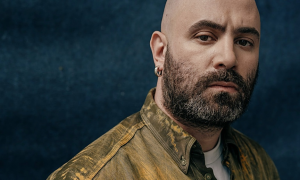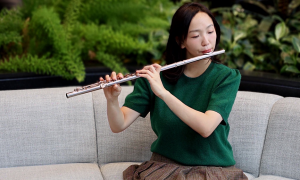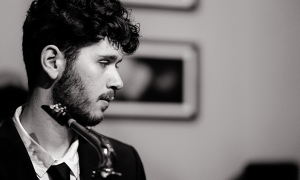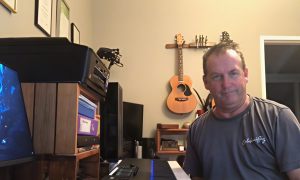Home » Jazz Articles » Take Five With... » Take Five with Ido Spak
Take Five with Ido Spak
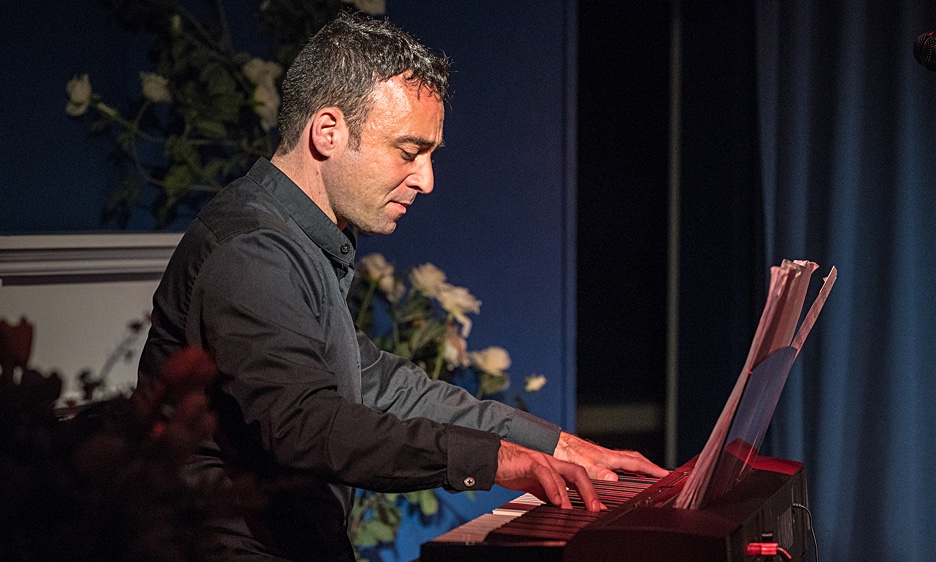
Meet Ido Spak
Ido Spak's jazz journey: Ido Spak is a composer, arranger and pianist. He concentrates on jazz-fusion with the influence of classical techniques and Middle Eastern music. Ido wishes to bring new things to jazz and combine new rhythms and new ways of improvisation. Ido Spak writes music for films and has experience as a music director in theatres. His first station—Israel. Ido Spak started his journey in Israel 30 years ago, trying to learn to play the guitar. It didn't work well; his friend told him that he's not a good guitarist and that he should try a different instrument and so he did.His next step was to study orchestral conducting in the Netherlands and here, more than the music, the language was his big difficulty. In order to deal with this challenge, he translated all of Yehuda Amichais poems, late in the evenings in his small apartment. Ido had to practice piano with headphones in order not to disturb the neighbours, because the school didn't have enough pianos to practice on. Those were crazy days and nights for him, so he decided to leave...
The next stop of his journey was the UK. Spak lived for three years in Canterbury, a few months in London and one year on the beach in Margate. Ido practiced 12 hours a day on the pianos owned by the music department at the university of Canterbury. He spent the whole day in an old building on the ancient wall that used to be a medieval police station, haunted by ghosts, practicing hour upon hour in rooms that used to be prison cells. those were beautiful times where all of the music from his first album was composed. Unfortunately, the music was technically too hard for all of the musicians that he knew on the British music scene and so, he found himself constantly flying to Berlin in order to record there. Next station: Berlin.
Moving to Berlin was the most reasonable move, as all of Ido's old friends from high school had moved there and many more friends kept on coming. He found himself sleeping on the couch at the flat of the same old friend that had told him he was not a good guitarist and that he should switch to piano. Ido managed to find a flat within a week and learned the language very fast thanks to the 500 poems of Yeuda Amichei that he had translated to Dutch seven years prior. Ido found himself taking part in a most exciting project, Iran & Israel Sistanagila, playing with Israelis and Iranians in concerts all over Germany and enjoying close friendship with wonderful people from Iran.
Ido Spak's next station is Lüneburg. Whereas all of the previous relocations had been made in the name of music, it was love that brought him to Lüneburg. He has moved to this city in order to marry his future ex-wife, who has also been the inspiration for three pieces from my albums, "Safe Journey" and "Wrong Direction." "Lumina," "Funny" and two numbers from the follow-up album, In A Hot Distant Land, were written for our dogs. Since arriving in Lüneburg Ido has completed his third album, Wrong Direction and started composing classical music for opera projects, such as Kammeroper Freiberg Act II, which has been performed in Leipzig featuring Ido Spak on the piano and his classical music composed for piano and saxophone.
Ido also started working as a composer, pianist and producer for Franziska Bub Productions. Another project is with the rapper, Ewane Makia, who was born in Cameroon, for whom he orchestrates and conducts. Ido also teaches piano and composition at Fit in Music and in Musikplanet. Another project is a soul project with the singer, Nicole Sperber and her husband, Mathias. During the past years, Ido started playing concerts with the flamenco guitarist, Paco Hallak. The next project is the fifth album Epidemic Adventures for which Ido Spak has started a crowdfunding campaign in order to raise the necessary funds for the album.
Instrument:
PianoTeachers and/or influences?
Bud Powell was the one who helped me to get into bebop and Avishai Cohen was the one to bring me into modern jazz. After playing traditional jazz through my last years in Israel and all through my adventures in Amsterdam, I moved to the UK and started immediately composing modern Jazz while studying classical music. At that time, my influence was Avishai Cohen, Omer Avital, but also Franz Liszt, Rachmaninov, Schubert and Bach. Through my life in Berlin I started composing serial music as well using the Schönberg technique and I also collaborated with musicians from Iran, Syria and Palestinian origin and explored their tradition. All of these elements started appearing in my second album Safe Journey, my third album Wrong Direction and the fourth one In a Hot Distant Land.I knew I wanted to be a musician when...
A part of me already knew it when I was 10 years old and dreamt about playing guitar. I started composing at the the age of 11 and when I interacted with other musicians, it was clear that I had a perfect pitch. All through my teenage years it was clear to me that I would study law and hopefully find my way in politics. The final decision was made during the army, which was one of the hardest times in my life. Not being able to play piano 10 hours a day drove me crazy.Your sound and approach to music:
My dream has always been to build a bridge between styles and that's why I studied orchestral conducting and classical composition while playing jazz in my free time. I had practiced as a student six hours a day on classical pieces of Franz Liszt and Schubert or Rachmaninov, two hours on jazz improvisation in 11/8, 21/16 and other non-conventional time signatures and the other four hours, technical problems and finished my day at 11 at night, writing homework. The goal was to bring the classical techniques into my improvisation and translate them into modal sound and a-tonal sound. Through my journeys in Germany and tours with musicians and friends whom I could have met in Israel only on the battlefield, I explored Arab and Iranian traditions with great fascination and reharmonized the traditional melodies with a technique that I had learned from Kenny Werner, jumping from different tonal systems with modal voicings using the melody as the glue between the chords.Your teaching approach:
I always work in a Lego form, looking at the small details and working on each small piece separately before building up and playing the whole form. With improvisation, I use elements the same way as Barry Harris, thinking about a scale, intervals that you can play with it, block techniques, graphical improvisation, etc.Your dream band:
I am very grateful to have the chance to work with my current band. I have been playing with Jan-Gerrit Lütgering and Jean-Philippe Tremblay since 2015 and this energy is something that you build through mutual growth. Alex Möckel has been playing drums for this band since 2019 after four years of struggles to get a drummer who is committed and not scared of the rhythmical challenges.Road story—your best or worst experience:
After a concert in Manchester with the legendary bassist Paul Carmichael, our car just died in the middle of the night in the middle of a very dangerous road and we had to jump over the fence since there was no space on the side and the other cars could easily crash into our car. The police rescued us and we were towed to Birmingham and waited an hour until the next rescue service towed us to Essex, where we waited for another truck to tow us to London, and there, after an hour waiting, we climbed into our last rescue truck where I made a false movement and injured my left hand. After arriving at the container in north London and unloading all of the equipment, I could finally start heading to my AirB&B where my future ex-wife waited, impatient and angry. After arriving at noon, I got an email from an opera project that I had composed for, regarding my composition, stating that the piano players couldn't play the part and I would have to play it by myself. Once I came back to Germany, I had to buy a big portion of Voltaren and start practicing for the upcoming concerts in Leipzig.Favorite venue:
It's a very hard question. I really enjoyed playing in Bochum one time. The piano was not amazing, but the people were so warm and kind. Another venue was in Uelzen. I like it when the people are kind and friendly regardless of how good the equipment is. Mendelssohn House was another place where I had a small audience but an amazing Steinway.Your favorite recording in your discography and why?
I really don't have any favorite recordings. My compositions are like my children and they are all a part of one whole big journey through the Middle East, London, Holland, Germany, New York and it's a part of who I am. The next album excites me the most because it hasn't been made yet and it's all about the hard work and investment leading to the final result, which makes it more meaningful.The first jazz album I bought was:
That would be Bouncing with Bud with "I'll Keep Loving You" which was the first jazz tune that I played by ear.What do you think is the most important thing you are contributing musically?
I believe my greatest contribution is simply making our planet a better place, by breaking the national boundaries and sharing ideas globally, building international friendships and promoting peace. The thing that touches me the most is all to see people from Indonesia, Malaysia, Africa and the Arab world reacting to my music on my Facebook page.Did you know...
My second love is vegan cooking. I used to work as a cook between my studies and I know Indian cuisine, Chinese, Syrian, Nigerian and many more. I also run marathons and lift weights in my free time.Albums you are listening to now:
Sergei Rachmaninov piano sonatas, which I am currently learning and Ignacy Jan Paderewski whom I discovered first as a student in the UK and rediscovered two weeks ago while driving to the supermarket—I will definitely play his piano concerto after I finish with Rachmaninov.Desert Island picks:
Paco Hallak: Hanin Avishai Cohen: Adama Yemen Blues Adam Ben Ezra: Can't stop Running Tori Amos: Boys for PellHow would you describe the state of jazz today?
Today, jazz has transformed into something completely different. No longer the Afro-American genre that we once had. It can be anything from pop, Afro-Caribbean, Kurdish etc, as long as you have the freedom, improvisation, rhythm and harmony elements. On the other hand, most people prefer an instant superficial excitement without having to put too much energy into it so jazz is no longer mainstream. I am still optimistic when I see new pupils who still long to learn the language of Oscar Peterson and Bud Powell.What are some of the essential requirements to keep jazz alive and growing?
We need to keep on creating and bringing new ideas. We need to invest a lot in the education of the new generation and engage them to really explore and appreciate this tradition but always look to the future and expect that technological developments will have an impact on the future of jazz. We must remember Billie Holiday and still be open to new developments.
What is in the near future?
I am raising funds through a crowdfunding campaign to record my new album Epidemic Adventures which will comprise traditional Kurdish and Jewish pieces as well as new compositions that I wrote also for a new love that I found during the lockdown.What's your greatest fear when you perform?
When I perform, I cannot afford to have fear. I focus on giving the best performance and communicating with my team. When I go on the stage, I know that I have practiced more than 20,000 hours for that single moment and nothing can go wrong. We will create imperfect moments and it's beautiful because it will never be perfect since we are human and humans aren't perfect.What song would you like played at your funeral?
Mahler's 9th Symphony, 4th Movement.What is your favorite song to whistle or sing in the shower?
It differs. Sometimes "Ashorer Shira," sometimes Schubert or "Mi Tierra."If I weren't a jazz musician, I would be a:
I would probably be a lawyer.If I could have dinner with anyone from history, who would it be and why?
Martin Luther King. He was a man with a great vision who has inspired so many people and I could learn a lot from him.Tags
Take Five With...
Ido Spak
AAJ Staff
Bud Powell
Avishai Cohen
Omer Avital
Kenny Werner
Barry Harris
oscar peterson
Billie Holiday
PREVIOUS / NEXT
Support All About Jazz
 All About Jazz has been a pillar of jazz since 1995, championing it as an art form and, more importantly, supporting the musicians who make it. Our enduring commitment has made "AAJ" one of the most culturally important websites of its kind, read by hundreds of thousands of fans, musicians and industry figures every month.
All About Jazz has been a pillar of jazz since 1995, championing it as an art form and, more importantly, supporting the musicians who make it. Our enduring commitment has made "AAJ" one of the most culturally important websites of its kind, read by hundreds of thousands of fans, musicians and industry figures every month.










